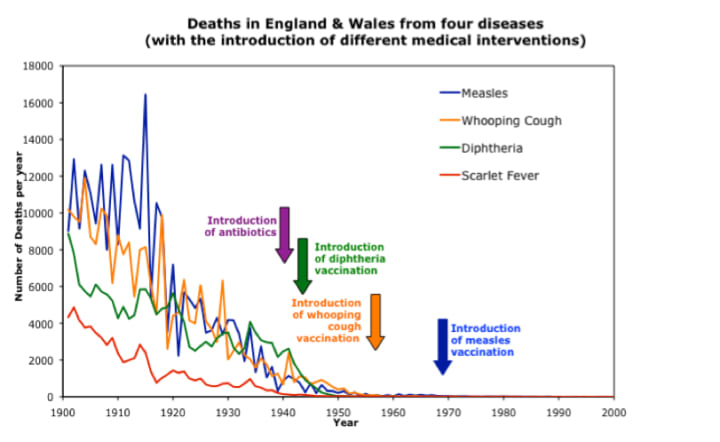When Vaccine Education Strategies Backfire
The Undesired Impact of Pro-Vaccination Tactics
The 18th century was an age of enlightenment. The improved steam machine sparked the industrial revolution that would change the world forever as child prodigy Wolfgang Amadeus Mozart played in palaces across Western Europe. The Queen of France Marie Antoinette's head rolled to announce the end of the country's monarchy. Fancy wigs were in when settlers of the thirteen British colonies fought for their freedom and won the bloody war to emerge as a new united power.
These were the days of reason and change, yet no innovation could protect the population from the ravages of infectious diseases. Illnesses such as smallpox chewed a big chunk out of the world's population, killing roughly 400,000 Europeans each year.
Deadlier Than War

The undesired impact of pro-vaccination tactics
History shifted when milkmaid Sarah Nelmes visited Dr. Edward Jenner's office in the English country with a severe rash on her hand. The physician diagnosed the dairy lady with cowpox, a relatively harmless infection which was passed on through her close work with Blossom, a cow.
The diagnosis intrigued Jenner, who was familiar with the agricultural community and the wives tales asserting that milkmaids never caught smallpox.
"Jenner speculated that a bout of cowpox produced immunity against smallpox and even encountered locals who claimed to have deliberately infected themselves to provoke such a response."
The doctor did not fear experimentation. He transferred pus out of Sarah Nelmes into young James Philip's arm and then exposed him to smallpox several days later. The boy was immune!
The First Vaccine

The process above shows the steps taken by Edward Jenner to create vaccination (Source)
He coined his new method "Vaccination," from the Latin word "Vacca" meaning cow.
The Royal Society demanded further proof when Jenner submitted his paper because microscopes of the time failed to display viruses. He vaccinated and monitored his son along with several other children, then published the results in 1798. The medical clan opposed and even ridiculed his discovery, convinced all diseases stemmed in the now disproven body humor theory.
Doctor Edward Jenner would never see the fruit of his labor. Vaccines became mandatory in England and Wales by 1853, thirty years after he died of a stroke. The war on smallpox lasted until 1980 when the World Health Organization declared eradication.
Vaccines and the Decline of Infectious Diseases

Decline of infectious diseases with the introduction of various vaccines over time (Source)
Humans prevailed, but the victory was short-lived. Old ghosts are marching in today. Infectious diseases came back with a vengeance, and experts blame the recent wave of anti-vaccine sentiment spread across the globe.
Health authorities fear the vaccination declines will reach a critical state known as "sub-herd immunity," which is the loss of indirect protection in a large group resistant to an infectious disease. The scientific consensus condemns those who oppose the procedure.
Ask a physician or a career scientist about anti-vaxxers and watch them get agitated as they recite their verdict. You will be in for quite the performance should you refer to people like Dr. Andrew Wakefield or Jenny Mccarty and other endorsing celebrities in a conversation on vaccines with career scientists.
The Other Side

Dr. Andrew Wakefield (above) is the father of the anti-vaccination movement. He directed Vaxxed, a 2016 American film alleging a cover-up by the Centers for Disease Control and Prevention (CDC) of a purported link between the MMR vaccine and autism. Actor Robert De Niro (Below) and media legend Harvey Weinstein produced the movie. (Source)
People are vocal online too. Arguments and group bashes are easy to find on social media platforms. The comment section of an article is a potent matrix for praise and hatred to grow.
When Vaccine Education Backfires
Both sides have their style of mediatic tactics to sway the public's attention. University of Edinburgh researchers recently investigated the impact of three pro-vaccination strategies on vaccination beliefs for a study published in the scientific journal PLoS One.
"A survey of people carried out in Scotland, and Italy measured attitudes towards popular misconceptions about the rubella vaccine and asked them whether they would give the vaccine to their child. " — Science Daily, 2017
The team separated participants into four groups and assigned them different approaches used to raise vaccine awareness. Strategies ranged from myths and facts leaflets to shock images and comparison tables between the benefits and potential side-effects. The fourth served as a control group given unrelated reading material.
Participants retook the survey after the experiment then once more seven days later. Researchers analyzed the data and concluded these strategies failed and also reinforced the opposing beliefs. The opposite results health marketers and their clients want out of an awareness campaign. These findings suggest the alleged educated crowd perpetuates the very problem they seek to defeat with their tactics.
"Our pattern of results thus confirms that there should be more testing of public health campaign messages. This is particularly the case because corrective strategies may appear effective immediately yet backfire even after a short delay, when the message they tried to convey gradually fades from memory, allowing common misconceptions to be more easily remembered and identified as true. " — PLoS One, 2017
Consistency is Key
Further research is necessary to confirm these findings, of course. The study only observed 120 people, which is a grain of sand in the desert and should not represent the entire human race, but the observed behavior in this small sample is consistent with the work of National Bestselling author Robert Cialdini who wrote Influence: The Psychology of Persuasion.
"Inconsistency is commonly thought to be an undesirable personality trait. The person whose beliefs, words, and deeds don't match may be seen as indecisive, confused, two-faced, or even mentally ill." — Robert Cialdini
The distinguished professor of marketing discusses how this powerful motive drives human action.
"Certainly, then, good personal consistency is highly valued in our culture. And well it should be. It provides us with a reasonable and gainful orientation to the world." — Influence: The Psychology of Persuasion
Pro-vaccination strategies tap into someone's dire need for consistency, whether they are presenting facts or pictures of children with Rubella, even emotional outbreaks and ridiculing sessions on social media platforms. The pressure pushes opposed-belief individuals closer to their initial commitment and engages the hard-wired consistency instinct adapted over eons of survival.
An intense psychological current will overpower your efforts, no matter how hard you believe your facts to be right or the nobility of your intentions as a provider of knowledge. These principles apply to the other side of the fence as well. Every action against the other will only widen the gap between the two ideologies.
Anybody opinionated on the matter should take a moment to ask themselves some fundamental questions:
- Does my intrinsic call for consistency influence my stance on the issue?
- Have I missed or ignored data that could potentially alter my opinion?
- Am I making matters worse by trying to convince others?
- Why is there a vacuum for different beliefs to rise and thrive in the first place?
Growing Skepticism

Measles was eliminated in 2000, but cases have been climbing in recent years. Centers for Disease Control and Prevention
Charles Mccoy explores the growing skepticism towards vaccines in his piece Why Are Vaccination Rates Dropping in America?
The author points out that a general decline in civic engagement might fuel for the trend, as well as a growing distrust of institutions.
"It is not just our trust in people that have decayed, but also social institutions. In 1964, 77 percent of the population said that they had trust that those in the federal government would do what was right; by 2014 this number had fallen to 24 percent." — Charles Mccoy, 2015
The same slump emerges for the medical system too:
"Research shows that in 1966, 73 percent of the population believed in the leaders of the medical profession; by 2012 this has fallen to 34 percent, and less than one-quarter (23 percent) of the population has confidence in the U.S. health care system as a whole."
Moving Forward
Vaccines might have been the ideal solution to infectious diseases in the past, but perhaps more efficient methods have yet to be discovered?Governmental and medical agencies must innovate to correct the rising distrust or infectious diseases will thrive again.
The system has made mistakes in the past. Think of barbaric practices such as bloodletting or heroin as cough syrup and lobotomies for hyperactive children. The fallible entity that approved of these treatments is still calling the shots today.
The medical community refused to acknowledge Edward Jenner's findings until three decades after his death. Are there potential answers buried under a stubborn paternalism that has haunted medicine since the days of Hippocrates of Ancient Greece?
There also could be other factors fuelling the return of these old foes. Are there such things as vaccine-resistant viruses which have evolved against our now potentially obsolete defenses? You see this adaptation occur with bacteria against antibiotics. Viruses are mysterious forces of nature and human knowledge on the matter remains in its infancy. Are experts missing something crucial to eradicating infectious diseases entirely?
The future is hazy for the species. Perhaps the crisis has already passed a tipping point of no return, and current institutions in power will collapse as did the Romans or the British imperial empire and French monarchy of the 18th century. A new and improved system will rise out of the chaos, and anybody who failed to prepare will find themselves out of authority. Revolutions are historically inevitable. These current trends could foreshadow a bitter divorce between state and health care, along with radical social changes in the decades to come.
Edward Jenner had the courage to challenge the norm and provide a groundbreaking solution which ended up saving countless lives. He paid attention to anecdotal evidence and was not afraid of experimentation to verify his theory.
Consistent problems call for revised solutions. New strength lies in the pocket sized devices connected to the wealth of human knowledge that unites minds and displays data like never before in history. Everyone can keep fighting over opposing beliefs or work as a team to find better answers that will benefit all; the choice is ours.
Reading List
1796 — Jenner tests smallpox vaccine
Pro-vaccine messages can boost belief in MMR myths, study shows
Why Are Vaccination Rates Dropping in America?
Other Posts by Alex Bernier
About the Creator
Alex C-B
Pieces of myself through facts and fiction - A fallible human of the digital era. I bought the ticket, missed the ride, then tripped down the rabbit hole and woke up stranded with you in this strange matrix.
Enjoyed the story? Support the Creator.
Subscribe for free to receive all their stories in your feed. You could also pledge your support or give them a one-off tip, letting them know you appreciate their work.






Comments
There are no comments for this story
Be the first to respond and start the conversation.